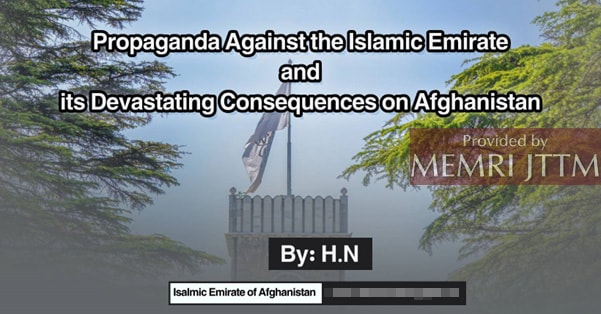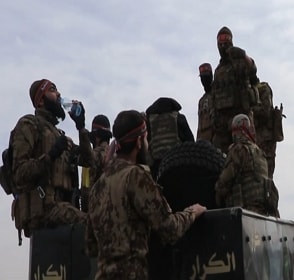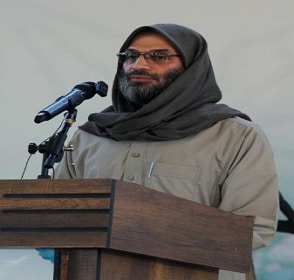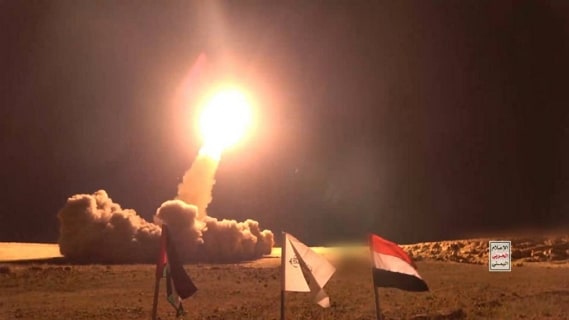The following report is now a complimentary offering from MEMRI's Jihad and Terrorism Threat Monitor (JTTM). For JTTM subscription information, click here.
In an article published on its official website, the Islamic Emirate of Afghanistan (IEA, i.e., the Afghan Taliban) accuses the West of disseminating false propaganda against the Taliban government in Afghanistan, painting it as regressive and hindering development work. The IEA has banned girls and women from schools, colleges, universities, parks, and workplaces.
"The persistent dissemination of negative narratives has also impacted international perceptions and relations with the Islamic Emirate. Many countries have hesitated to engage in diplomatic talks or provide much-needed aid due to the stigma created by biased media coverage," the article says.
It adds: "False propaganda can contribute to economic instability by deterring foreign investment, disrupting trade relations, and creating uncertainty in financial markets. The perception of a volatile or unsafe environment based on exaggerated reports can dissuade businesses from operating in Afghanistan, leading to unemployment, reduced economic opportunities for Afghans and further deepening the suffering of vulnerable populations."

Following are excerpts from the article:
"With The Re-Establishment Of The Islamic Emirate, A Wave Of Misinformation And False Propaganda Has Flooded Media Channels Worldwide"
"In an era where information spreads faster than ever, the power and impact of propaganda cannot be underestimated. When used responsibly, it can inform and educate. However, when wielded with malicious intent, it can sow seeds of discord and chaos. Nowhere is this more evident than in the realm of politics, where false propaganda against a ruling regime can have far-reaching and detrimental consequences.
"With the re-establishment of the Islamic Emirate, a wave of misinformation and false propaganda has flooded media channels worldwide. This onslaught of biased narratives has not only distorted the reality of the situation but has also had severe consequences for the Afghan people and the new government.
"One of the most damaging aspects of the false propaganda against the Islamic Emirate is the portrayal of its governance as oppressive and regressive. Western media often paint a picture of a brutal regime, ignoring the complexities of the political landscape and the efforts made by the Islamic Emirate to establish stability and order.
"Claims of widespread human rights abuses and harsh treatment of women have been sensationalized without verifiable evidence. Such propaganda not only spreads false information and distorts the reality of the situation, but it serves to deepen divisions and hinder constructive dialogue.
"The persistent dissemination of negative narratives has also impacted international perceptions and relations with the Islamic Emirate. Many countries have hesitated to engage in diplomatic talks or provide much-needed aid due to the stigma created by biased media coverage. This isolation not only hampers the Islamic Emirate's ability to address critical issues like poverty and healthcare but also perpetuates a cycle of distrust between Afghanistan and the international community.
"False propaganda can contribute to economic instability by deterring foreign investment, disrupting trade relations, and creating uncertainty in financial markets. The perception of a volatile or unsafe environment based on exaggerated reports can dissuade businesses from operating in Afghanistan, leading to unemployment, reduced economic opportunities for Afghans and further deepening the suffering of vulnerable populations."
"The Proliferation Of False Information Creates A Significant Challenge In Rebuilding Trust Between The Afghan Government, The International Community, And The Afghan People"
"The continuous barrage of negative portrayals in the media can have a profound psychological impact on Afghan society. It can contribute to feelings of hopelessness, distrust, and trauma, particularly among vulnerable populations such as children, women, and internally displaced persons (IDPs) who are already grappling with the challenges of conflict and displacement. Furthermore, it can also contribute to a sense of alienation and isolation, particularly among younger generations who aspire for a more positive future.
"The spread of false propaganda can also have broader implications for regional and global security. Misinformation and distorted narratives fuel fear and mistrust, potentially leading to increased tensions between neighboring countries and international actors. This could hamper efforts at regional cooperation and conflict resolution, further destabilizing an already fragile region. False propaganda often perpetuates stereotypes and misconceptions about Islam and Afghan culture. This can lead to misunderstandings and prejudice, hindering efforts to promote intercultural dialogue and mutual respect.
"Addressing these stereotypes and promoting accurate representations is essential for fostering harmony and inclusivity within Afghan society and beyond. Harnessing the power of technology and social media for positive messaging is another avenue to counter false propaganda. Utilizing platforms to share authentic stories, amplify diverse voices, and showcase the progress and resilience of Afghan society can help reshape narratives and counter negative stereotypes.
"The proliferation of false information creates a significant challenge in rebuilding trust between the Afghan government, the international community, and the Afghan people. Reversing the damage caused by years of negative propaganda requires concerted efforts in transparency, accountability, and genuine dialogue. Rebuilding trust is crucial for sustainable peace, development, and reconciliation efforts.
"Investing in media literacy and education is paramount in combating false propaganda. Empowering individuals with critical thinking skills and the ability to discern fact from fiction is essential in countering misinformation. Educational initiatives that promote media literacy can empower Afghan citizens to engage critically with information and contribute to a more informed and responsible public discourse.
"The impact of false propaganda on the lives of Afghans is profound and multifaceted, affecting various aspects of their daily existence, social interactions, and long-term prospects. Misinformation can contribute to stigmatization and discrimination against certain groups within Afghan society. For example, communities associated with particular ethnicities, religious beliefs, or political affiliations may face increased prejudice and marginalization based on false narratives propagated by media sources."
"Addressing The Consequences Of False Propaganda Against The Islamic Emirate In Afghanistan Requires A Multifaceted Approach That Encompasses Media Integrity, Diplomatic Engagement, Societal Empowerment, And Technological Innovation"
"Continuous exposure to false or biased information erodes trust in institutions, including the government, media, and humanitarian organizations. This lack of trust can hinder efforts to deliver essential services, address social issues, and promote civic engagement, leading to a sense of disillusionment and apathy among the populace.
"The perpetuation of false narratives can pose significant obstacles to reconciliation and peacebuilding efforts. Misinformation can deepen mistrust between conflicting parties, hinder dialogue, and negotiation processes, and impede initiatives aimed at fostering understanding, forgiveness, and long-lasting peace. To mitigate the damaging effects of false propaganda, there is an urgent need for unbiased reporting and fact-based analysis.
"Genuine efforts must be made to understand the complexities of Afghanistan's political and social dynamics, rather than resorting to sensationalism. Engagement and dialogue, both domestically and internationally, are crucial in fostering understanding and finding common ground. Constructive criticism, coupled with support for initiatives aimed at improving governance, can pave the way for a more inclusive and sustainable future for Afghanistan.
"The consequences of false propaganda against the Islamic Emirate in Afghanistan are far-reaching and detrimental. They hinder the country's progress, deepen divisions, and impede efforts to address pressing challenges. It is imperative for media outlets, governments, and civil society to prioritize accuracy and fairness in their narratives, fostering a climate conducive to dialogue, cooperation, and ultimately, positive change for Afghanistan and its people.
"In conclusion, addressing the consequences of false propaganda against the Islamic Emirate in Afghanistan requires a multifaceted approach that encompasses media integrity, diplomatic engagement, societal empowerment, and technological innovation. By working together to promote accurate information, foster dialogue, and build trust, stakeholders can contribute to a more peaceful, prosperous, and inclusive future for Afghanistan."
Source: May 18, 2024. The original English of the article has been lightly edited for clarity and standardization.
The full text of this post is available to subscribers.
Please login or register to request subscription information from MEMRI






